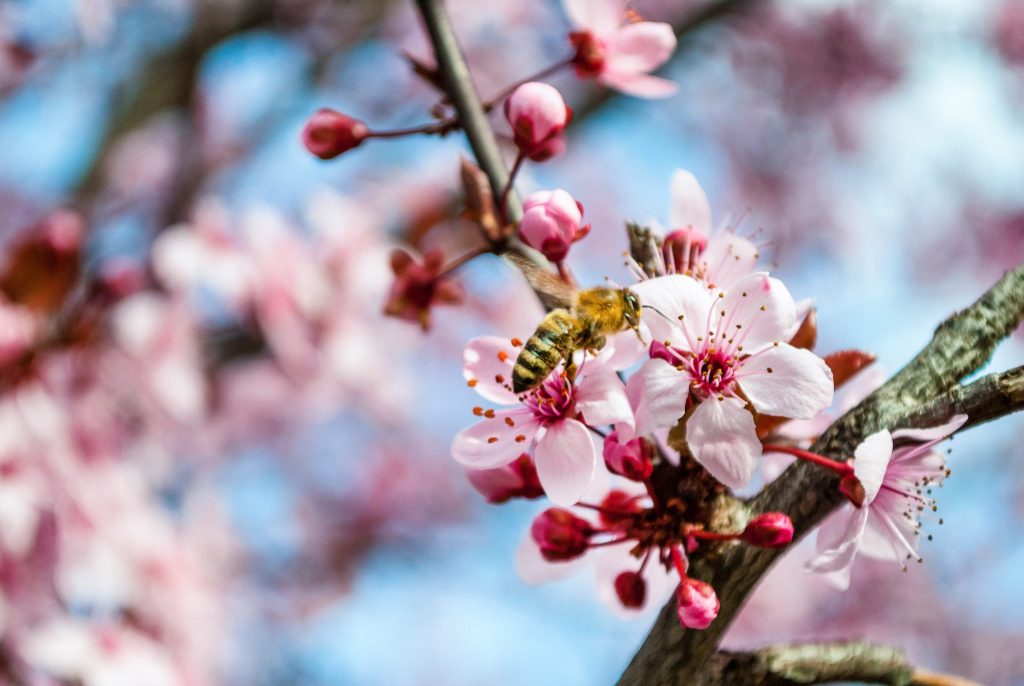If you purchase an independently reviewed item through our site, we earn an affiliate commission. Read our affiliate disclosure.
Honeybees serve a key role in agriculture for humans. The nectar collected by honeybees is used for making honey, and it is the only food made by an insect which humans consume. The worker bees play the role of converting nectar into honey using their enzymes. Moreover, honeybees also provide pollination services, and this is where bee brokers come in. A bee broker may be described as the individual who is in the honeybee business for commercial purposes. They engage in a number of activities which we shall discuss in this article.
Key Points to note about Bee Brokers
A bee broker is responsible for brokering various deals with farmers and others in the agriculture industry, who desire to have their crops pollinated. They are responsible for coordinating the transport of honeybees across the country for pollination services. In this regard, attention has shifted from honey production to pollination. Millions of honeybees and hundreds of bee brokers traverse the United States, pollinating the booming almond and fruit orchards and expansive farms.
What Does Bee Broking Entail?
- Requires a lot of mobility – this is attributable to the fact that diverse plants bloom at different times, and the brokers have to ferry the honeybees to the area where the plants are blooming. The beehives are taken around the state either for pollination or plant-specific honey production. The honeybee colonies are transported away from agricultural areas for the honeybees to get access to a variety of natural forage. Remember, they are usually limited to particular crops for an extended period, hence this need.
- They bee broker has to seek permission from the land owner whenever they move around and position their hives on land. The honeybees might also collect nectar from crops and plants within this locality.
- The bee broker might not have direct control over where and which plants the pollinating bee visits. They are also not responsible for how the plants are managed in the areas they provide pollination services to. The honeybees might be placed within a specific orchard or field, but they can still forage anywhere else within the area.
What is the Role of a Bee Broker?
Bee brokers play an important role. Some of these are listed and explained below:
1. Pollination Services
Bee brokers collaborate with commercial agricultural enterprises that require pollination services. Most of these firms plants crops and fruits in expansive pieces of land that cannot be fully pollinated by wild bees. They therefore hire bee brokers who travel long distances to provide the needed service. This has created a mutual benefit, where the broker earns some commission and the farmers also enjoy a decent paying yield.
2. Renting out Bee Colonies
Some bee brokers will rent out their bee colonies to other bee brokers that provide pollination services. The latter will move around with these hives several times of the year to cater for different orchards and farms, depending on the flowering seasons of the crops. Bee brokers also transport beehives across different States.
3. Brokering
This is also another responsibility undertaken by a bee broker. They will act as an intermediary between the growers and the beekeepers. They will organize for the delivery of the bees to the growers for a fee. Additionally, the bee brokers will also perform any of these roles:
- The bee broker, just like any other beekeeper, will keep bees for the normal purpose of honey production and honeybee products. The honeybees will also be used as pollination stock.
- Builds hives from scratch or assembles components of already made beehives.
- The maintenance of beekeeping equipment.
- Monitoring and maintenance of honey bee health and condition.
- Treating and painting of hive parts and components to prevent rotting.
- To negotiate for sites on which to raise honey bees with various stakeholders such as property owners and government agencies.
- Transportation of hives to various sites recommended for honey or pollen production.
- Placement of honeycomb imprinted frames in hives.
- Honey harvesting and extraction using various recommended equipment.
- Repair and maintenance of beehives and the honey extraction equipment,
- Provide required nutrition to honey bees and control bee parasites, diseases, and pests.
- Packaging and selling of beekeeping products such as honey, beeswax, pollen, and propolis.
- Requeening honeybee colonies and raising the queen bees either for their own use or commercial purposes.
- Negotiating with farmers or huge agricultural firms for pollination services to crops such as vegetables, almonds, nuts, fruits, seeds and other crops.
4. Contracting Beehives
Contracting entails first negotiating with the farmers for honeybee pollination. The broker then proceeds to negotiate with beekeepers to avail the honeybees to the farmer. The broker will act as the middleman to both of these parties. Since the broker is the intermediary, he or she will handle the real and tough work such as:
- Unloading of the honey bees that have shipped to various farms. He or she will then distribute the hives on the fields and orchards. This work is carried out at night.
- The bee broker carries out the inspection and grading of the honey bees to ascertain they are healthy and strong for the work at hand. If the required standard is not met then he or she has to look for more hives so that the required pollination strength is met.
- Taking responsibility of the honeybee health for has long as the bees are still under his or her care. This might at times mean feeding of the bees, though he can charge back this to the bee broker. All of this requires a lot of devotion and will take time, work, and investment.
- The bee broker will gather and prepare the rented hives at the end of the bloom. These will be loaded into the back of trucks and transported back to their owners. This work requires some effort and caution so that the bees are not lost during transportation. However. All these require serious commitment and it is a big responsibility that most might never handle. In fact, anyone who is not conscientious and hardworking may never last long in this business of bee broking. Only the best in the business sign up for contracts they can manage.
5. Other Roles
Some of the other important carried out by a bee brokers include the following:
- Removing dead honeybees from the hive and also dispose larvae that did not mature.
- Safely disposing of any dead or sick bees, to minimize chances of disease spread. He or she is also responsible for the general well-being the honey bee colony.
- He or she is the middleman between bee brokers and the huge agricultural companies and farmers that require pollination services.
- Making it possible for almond growers to access the rental hives.
- Acting as a representative of the bee brokers and ensures the honey bees are safe.
- Transporting beehives from one job site to another.
- The brokers will also liaise with company growers to ascertain the number of hives they need and ensure strict rules are followed. This entails issues such as spraying of chemicals before or when the bees have been brought.
- Constantly communicating with the beekeepers, to give updates on the hives.
- During the pollination season, the bee brokers swing into action. First off, the honeybees are audited. This involves evaluating 10% of the bee broker’s hives. The entire bee broker hives should be checked to ensure the honeybees meets the required standards. That way, the growers will get value for their money.
- During the peak season, bee brokers will be on the road all through, covering thousands of kilometers to serve thousands of their contracted bee brokers. They will mainly instruct them to distribute the hives or haul them by themselves.
Peak Season for Pollination Services
In the US for example, during peak season, huge trucks can be seen ferrying millions of bees on board. This is a rare sight to behold and is the biggest movement of bees in the States.
The bee broker’s job is never an easy one. You can liken it to trying to round up chickens that has been let lose into the open field. This is one of the toughest jobs you can find. It is also a unique given the commitment, focus, and determination its takes for one to succeed in it.
With winter being the off-peak season in beekeeping, the bee broker will be working on finding leads and scheduling deliveries with beekeepers. He/she will ensure fit and healthy pollinator bees are delivered on time.
Furthermore, bee brokers sign contracts with almond companies and perform a number of tasks:
- Sourcing of the bees.
- Planning for the delivery of the pollinator bees.
- Designing the hive drops.
- Auditing of the 10 percent of the pollinator bees to ensure they meet the required standard.
- Handles the financing and will dispatch the cheques. Once the work is completed, the bee broker will ensure the bees are delivered back to their home.
Bee brokers are also involved in the following work during peak season:
- The bee broker will develop written contracts to eliminate miscommunication and any potential problems.
- Will negotiate prices, timing, and placement of hives. This is done at a fee.
- The bee brokers also advise growers to protect the honey bees from harmful chemicals such as pesticides.
- They also liaise with beekeepers to deliver additional colonies in case the need arises during pollination.
- The bee broker is in charge of collecting rental fees. In case the grower fails to pay, he will lose his money.
- The broker acts as the apiary inspector of the honeybee colony strength. He/she evaluates the honeybee colonies and will determine the payable fee depending on the average colony strength. For instance, for almond fields, the broker will get paid based on the average number of bees per colony.
Challenges Facing Bee Brokers
The work of a bee broker comes with its share of challenges and difficulties:
- Beekeeping is challenging work with some dishonest bee brokers ripping off beekeepers of their hard-earned profits. Thus, it leads to frustration. The task of coordinating huge mass migration of thousands of bees to various locations or states is never an easy job to do. The bee brokers are also among the few beekeepers that keep an eye on the massive migration of bees.
- The coordination of all logistics that relate to pollination services is a tiresome practice that requires a lot of energy, effort, and time. If this is poorly managed from the beginning of keeping, brokering and transportation, it will bring huge financial losses and can even lead to loss of the bees.
- One of the challenges that bee brokers face that cannot be ignored, is the effects of pesticides. These can lead to huge losses and hence the need for a proper channel of communicating or notifying beekeepers and farmers when to/ not to spray their crops. The use of herbicides and habitat loss has resulted in destruction of honeybees colonies. Pesticides such as clothianidin has been found to negatively affect bees’ health in many ways, thus substantially weaken the immune system and slows reproductive rate.
- The process of procuring bees is a stressing to the bees. The honeybees are usually loaded into trucks at night or early morning, thus disrupting their normal physiological process. They will also be fed on substitutes instead of their natural foods such as pollen and nectar. This is aimed at quickening the reproductive cycle so that they can repopulate the hive in readiness for pollination. They are then ferried across various states, dropped in an empty field and given more substitute feed as they wait for blooming almonds fields. All this is a total distortion of the honey bee natural process.
- The market has been tight and demand for pollination services ever increasing. This has forced bee brokers to increase their search for pollination bees. Sadly, bee brokers are seeking honey bees from smaller operators such as backyards beekeepers. These are loaded into trucks and taken to almond fields for pollination. Bee brokers have also been forced to secure more bees than they need; a strategy that is further aggravates the situation in the tight market.
- Some bee brokers are also evading taxation and have not registered their hives.
- Furthermore, bees need clean water, and its availability is important. The water source should not be contaminated with bacteria.
- Finally, a lack of adequate all-season forages affects bee brokers.
Solutions to Challenges
- Popularizing the registration requirements, its benefits and the implications to bee brokers. This is doable through outreaches and public education.
- A thorough review of the bee brokers registration forms. That is, reviewing how the registration helps the industry and how the fees are utilized.
- Evaluating registration fee schedules and revise where necessary.
- Injecting more funds into expansion of research on deadly parasites such as varroa mites.
- Boosting the availability of best quality, all-season forage.
- Issuing guidelines on planting and maintenance of forage that is ideal for honey bees, especially at large scale farms and orchards.
- Giving incentives to those who adopt pollinator-friendly land management practices.
Pollination Agreements
Hiring beehives has become so popular since it is the easiest way of obtaining hives for pollination. The beehives are procured directly from the bee broker who is linked to beekeepers and or growers. Such an arrangement is convenient since it allows the growers to specify exactly what they need.
It takes plenty of time for the bee broker to prepare pollinating colonies, more so, when during honey flow or when the pollination period falls on early spring. As a matter of fact, it takes months for the bee broker to prepare the hives for pollination services. Therefore, it’s important for growers to order pollinating hives early enough to allow adequate time for preparation and delivery.
Written pollination agreements clearly outline the responsibility of each of the parties involved in the transaction. It is preferred by bee brokers since it clarifies each of the individual’s responsibility. The agreement therefore helps eliminate any possible misunderstandings in the future.
The most important aspects of a pollination agreement that should be specified include:
- Concerned party names and addresses
- Agreement date
- Location of the farm or crop field
- The total number of colonies required
- Delivery dates of the hives
- Colony strength, which specifies the bees and brood
- Hive distribution throughout the crop
- The rental amount and the terms of the payment
- A mediator in case there is a dispute
- Independent hive audit for quality
- Guidelines on actions to take in case an audit fails
- Time required for issuing a notice prior to shifting the bees to another location
- Consent to protect the bees from pesticides and other harmful chemicals while in the field
- A witness to sign the agreement.
The main purpose of written pollination agreements is the best practice that protects the parties involved. It will minimize misunderstandings between them.
Conclusion
The role of a bee broker is both exciting task full of challenges, problems, commitment, and determination but also a rewarding field work when navigated successfully. Though the bee brokers are faced with enormous challenges, it can be solved which is good news. More creation of awareness, conferences, seminars, meetings, and training need to be conducted in order to recruit many people to be bee brokers since there is only handful of them.
In a nut shell, the roles bee brokers played is so huge, and really a tough job. They are the middle agents and do all coordination of logistics, and management. This work require a lot of hard work that must be done properly to ensure success and it comes with a big responsibility and people need to be conscientious and hardworking in order that they long as bee brokers. As far as bee broker is difficult and rewarding job you have to be totally resilient to survive being a bee broker.
References
- https://www.theguardian.com/australia-news/2020/oct/18/meet-the-bee-brokers-you-never-stop-learning-about-bees-theyre-just-incredible
- https://mybrokerbee.com/
- https://www.beeculture.com/tag/bee-brokers/
- https://sacramento.cbslocal.com/2022/03/04/bee-brokers-bring-high-tech-to-buzzing-business/
- https://www.beesource.com/threads/bee-brokers.247827/
- http://beepollination.com/
- http://almondbeepollination.com/
What are your thoughts on this article? Leave a comment below and let us know.
 BeeKeepClub Resources and Guides for Beekeepers
BeeKeepClub Resources and Guides for Beekeepers


